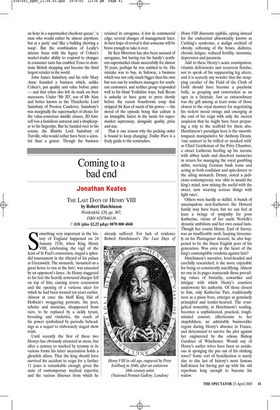Coming to a bad end
Jonathan Keates
THE LAST DAYS OF HENRY VIII by Robert Hutchinson Weidenfeld, ┬Ż20, pp. 367, ISBN 0297846116 Ō£å ┬Ż18 (plus ┬Ż2.25 p&p) 0870 800 4848 Something very important in the history of England happened on 24 January 1536, when King Henry VIII, celebrating the vigil of the feast of St PaulŌĆÖs conversion, staged a splendid tournament in the tiltyard of his palace at Greenwich. The monarch, ŌĆśmounted on a great horse to run at the listsŌĆÖ, was unseated by an opponentŌĆÖs lance. As Henry staggered to his feet the heavily armoured charger fell on top of him, causing severe concussion and the opening of a varicose ulcer for which he had been treated ten years earlier. Almost at once the bluff King Hal of HolbeinŌĆÖs swaggering portraits, the poet, scholar and musician, disappeared from view, to be replaced by a sickly tyrant, brooding and vindictive, the reach of his power symbolised by periodic beheadings as a sequel to elaborately staged show trials.
Until recently the first of these two Henrys has obviously attracted us more, but after a century so marked by tyranny in its various forms his latter incarnation holds a ghoulish allure. That the king should have survived his accident to reign for a further 11 years is remarkable enough, given the state of contemporary medical expertise and the various illnesses from which he already suffered. For lack of evidence Robert HutchinsonŌĆÖs The Last Days of Henry VIII discounts syphilis, opting instead for the endocrinal abnormality known as CushingŌĆÖs syndrome, a malign cocktail of obesity, softening of the bones, diabetes, chronic fatigue, reduced fertility, insomnia, depression and paranoia.
Add to these HenryŌĆÖs acute constipation, vitamin deficiencies and recurrent fistulas, not to speak of his suppurating leg ulcers, and it is scarcely any wonder that the strapping cavalier of the Field of the Cloth of Gold should have become a psychotic bully, as grasping and remorseless as an ogre in a fairytale. Just as extraordinary was the gift among at least some of those closest to the royal monster for negotiating his violent mood swings and emerging at the end of his reign with only the merest suspicion that he might have been preparing a trip to the scaffold for them also. HutchinsonŌĆÖs paradigm here is the smoothtongued, manipulative Sir Anthony Denny, ŌĆśone unmeet to be trifled or mocked withŌĆÖ as Chief Gentleman of the Privy Chamber, a closet Lutheran beefing up his income with abbey lands and dissolved nunneries in return for managing the royal gambling debts, servicing German bank loans and acting as both confidant and spin-doctor to the ailing monarch. Denny, noted a judicious contemporary, was ŌĆśable to mould the kingŌĆÖs mind, now mixing the useful with the sweet, now weaving serious things with light onesŌĆÖ.
Others were hardly so skilful. A bunch of unscrupulous nest-featherers the Howard family may have been, but we can feel at least a twinge of sympathy for poor Katherine, victim of her uncle NorfolkŌĆÖs dynastic ambitions and her own casual lusts. Though her cousin Henry, Earl of Surrey, was an insufferable snob, harping tiresomely on his Plantagenet descent, he also happened to be the finest English poet of his generation. Was envy at the heart of the kingŌĆÖs contemptible vendetta against him?
HutchinsonŌĆÖs narrative, level-headed and carefully researched, is the more enjoyable for being so consistently unedifying. Almost no one in its pages transcends those prevailing values of brutality, cowardice and intrigue with which HenryŌĆÖs courtiers underwrote his authority. Of those closest to him, only Katherine Parr, traditionally seen as a pious bore, emerges as genuinely principled and tender-hearted. The evangelical nonentity, in HutchinsonŌĆÖs reading, becomes a sophisticated, practical, toughminded consort, affectionate to her stepchildren, an admirably businesslike regent during HenryŌĆÖs absence in France, and determined to survive the plot against her engineered by the odious Bishop Gardiner of Winchester. Would any of HenryŌĆÖs earlier wives have been so assiduous in sponging the pus out of his stinking sores? Some sort of beatification is surely due to this last of historyŌĆÖs most famous half-dozen for having put up with the old reprobate long enough to become his widow.



















































 Previous page
Previous page